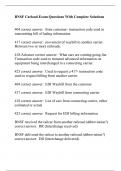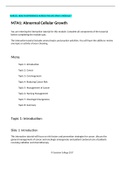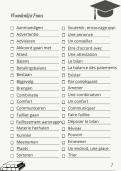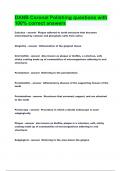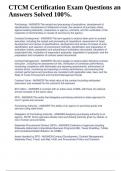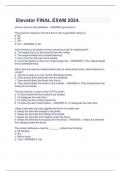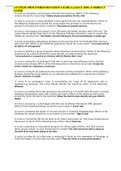Table of contents
Lecture 1 - Introduction 2
Lecture 2 – Emotional control 6
Lecture 3 – Emotional attention 10
Lecture 4 - Emotional Memory 14
Lecture 5 - Reward sensitivity and motivation 18
Lecture 6 - Neurocognitive characteristics of antisocial and aggressive
behaviour 22
I would really appreciate it if you would like to leave a review to let me know what you
thought of the summary. good luck with the exam you can do this! 😊
1
,Lecture 1 - Introduction
Study of affective processes is not new but has seen a recent rise:
Big landmark events: book expression of emotions (by Darwin)
o How the expressions of emotions differ across species
Term use
o Cognitive science was used a lot, more than affective science. Psychology and
neuroscience have ignored affective processes for a long time.
o Big rise in affective science term use, 90s. Huge popularity of studying
Affective processes:
Affect: affictus - to have been influenced/attacked
o Affective processes sometimes seem to overcome us.
It involves an evaluation of a situations as salient & thereby triggering an evolutionary
adaptive response.
Affective processes consist of different levels.
o Subjective: experience, you feel negative/positive about something
o Behavioral: motor expressions
o Physiological: brain/body components
James Gross' modal model (paper)
o Different stages when you encounter a situation.
o Situation --> attention --> appraisal --> response
Situation selection --> situation modification (modifying external factors) -->
attention (to what do you pay attention) --> appraisal, depends on beliefs,
biases, experiences --> response (modulating own response, e.g. deep
breathing)
In each stage there is a different way to regulate
Relationship between emotions and affective processes:
Embodiment: to what extend there is a strong physiological component is present
Event-focused: to what extend the processes occur at a specific time in relation to a specific
event. Triggered by/coupled directly by specific event.
Affective dispositions: no specific embodiment, low event focused.
Affective science & psychopathology
Affective symptoms in psychopathology:
Central n affective disorders (depression, bipolar disorder, anxiety)
Problems recently got worse (COVID)
Affective disturbance is present in almost every other psychological disorder:
o Emotional flattening: schizophrenia, psychopathy
o High sensitivity to reward: addiction
o Being hyposensitive to social emotional cues: autism
2
, o Explosive emotional responding (conduct disorder, borderline)
Categories of affective disturbance:
Whan can go wrong?
Reactivity problems:
o Intensity, duration, frequency, type
o Duration: how long an episode is. The problem is when it lasts for many
years/months. Frequency is about it coming back all the time.
Emotional regulation problems
o Awareness (panic disorder, over-aware), goals, strategy
How can we use affective science to improve understanding and treatment of
psychopathology?
The typical approach over the last decades:
The state of mental science:
Efficacy of treatment for mental disorders is approx. 50%.
Reasons for the lack of higher efficacy despite all the research:
1. Clinical heterogeneity:
i. Within disorder, there is a huge variety in the symptoms people show. E.g.
PTSD looking at all the symptoms and combinations of symptoms = 636120
different profiles with the same disorder. Assuming this is one group with the
same problem, but maybe they don’t.
2. Lack of mechanistic understanding:
i. We thought in a very simplistic way (depression vs healthy). Lack of
understanding why people show these disorders. Mechanistic background:
what is going wrong, what are the mechanisms.
Comorbidity and the need for a transdiagnostic perspective:
Possible explanations:
o Poor discriminant validity
o One disorder was first and triggered another disorder.
Primary vs secondary disorder?
o Common risk factors
Can be at different phases: predisposing (genetic, experience0, precipitating,
perpetuating (stress).
The grouping of disorders by the DSM does not reflect a mechanistic level:
Goal of DSM: develop a system to provide specific, reliable diagnosis based on clinical
experience. As objective as possible.
3
Lecture 1 - Introduction 2
Lecture 2 – Emotional control 6
Lecture 3 – Emotional attention 10
Lecture 4 - Emotional Memory 14
Lecture 5 - Reward sensitivity and motivation 18
Lecture 6 - Neurocognitive characteristics of antisocial and aggressive
behaviour 22
I would really appreciate it if you would like to leave a review to let me know what you
thought of the summary. good luck with the exam you can do this! 😊
1
,Lecture 1 - Introduction
Study of affective processes is not new but has seen a recent rise:
Big landmark events: book expression of emotions (by Darwin)
o How the expressions of emotions differ across species
Term use
o Cognitive science was used a lot, more than affective science. Psychology and
neuroscience have ignored affective processes for a long time.
o Big rise in affective science term use, 90s. Huge popularity of studying
Affective processes:
Affect: affictus - to have been influenced/attacked
o Affective processes sometimes seem to overcome us.
It involves an evaluation of a situations as salient & thereby triggering an evolutionary
adaptive response.
Affective processes consist of different levels.
o Subjective: experience, you feel negative/positive about something
o Behavioral: motor expressions
o Physiological: brain/body components
James Gross' modal model (paper)
o Different stages when you encounter a situation.
o Situation --> attention --> appraisal --> response
Situation selection --> situation modification (modifying external factors) -->
attention (to what do you pay attention) --> appraisal, depends on beliefs,
biases, experiences --> response (modulating own response, e.g. deep
breathing)
In each stage there is a different way to regulate
Relationship between emotions and affective processes:
Embodiment: to what extend there is a strong physiological component is present
Event-focused: to what extend the processes occur at a specific time in relation to a specific
event. Triggered by/coupled directly by specific event.
Affective dispositions: no specific embodiment, low event focused.
Affective science & psychopathology
Affective symptoms in psychopathology:
Central n affective disorders (depression, bipolar disorder, anxiety)
Problems recently got worse (COVID)
Affective disturbance is present in almost every other psychological disorder:
o Emotional flattening: schizophrenia, psychopathy
o High sensitivity to reward: addiction
o Being hyposensitive to social emotional cues: autism
2
, o Explosive emotional responding (conduct disorder, borderline)
Categories of affective disturbance:
Whan can go wrong?
Reactivity problems:
o Intensity, duration, frequency, type
o Duration: how long an episode is. The problem is when it lasts for many
years/months. Frequency is about it coming back all the time.
Emotional regulation problems
o Awareness (panic disorder, over-aware), goals, strategy
How can we use affective science to improve understanding and treatment of
psychopathology?
The typical approach over the last decades:
The state of mental science:
Efficacy of treatment for mental disorders is approx. 50%.
Reasons for the lack of higher efficacy despite all the research:
1. Clinical heterogeneity:
i. Within disorder, there is a huge variety in the symptoms people show. E.g.
PTSD looking at all the symptoms and combinations of symptoms = 636120
different profiles with the same disorder. Assuming this is one group with the
same problem, but maybe they don’t.
2. Lack of mechanistic understanding:
i. We thought in a very simplistic way (depression vs healthy). Lack of
understanding why people show these disorders. Mechanistic background:
what is going wrong, what are the mechanisms.
Comorbidity and the need for a transdiagnostic perspective:
Possible explanations:
o Poor discriminant validity
o One disorder was first and triggered another disorder.
Primary vs secondary disorder?
o Common risk factors
Can be at different phases: predisposing (genetic, experience0, precipitating,
perpetuating (stress).
The grouping of disorders by the DSM does not reflect a mechanistic level:
Goal of DSM: develop a system to provide specific, reliable diagnosis based on clinical
experience. As objective as possible.
3


